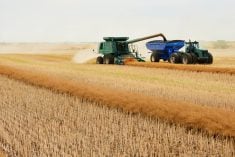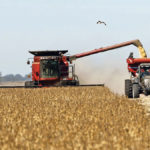(Reuters) — Several California companies and individuals tied to the largest beef recall in U.S. history have agreed to settle charges of animal cruelty and the slaughtering of sick cattle for food, including beef supplied to the National School Lunch Program.
The settlements end a federal fraud lawsuit begun in February 2008 by the Humane Society of the United States, which had obtained a video that appeared to show inhumane cattle treatment and improper inspections of sick cattle at a plant in Chino, California, run by Westland Meat Co. and Hallmark Meat Co.
Read Also

U.S. biofuel plan would reallocate half or less of waived blending quotas, sources say
The White House is considering a plan that would require large oil refineries to cover around half or less of the biofuel blending requirements recently waived for smaller facilities, according to three sources familiar with the matter.
Under the settlements, Westland agreed to enter a $155.68 million consent judgment, which its lawyer said is unlikely to be collected because the company is defunct, while its owner, Steve Mendell, agreed to pay $240,000.
The government also said M&M Management LLC, Cattleman’s Choice Inc., the estate of Cattleman’s late owner, Aaron “Arnie” Magidow, and Magidow’s widow, JoAnn, will pay $2.45 million. JoAnn Magidow was not accused of wrongdoing.
Two other defendants, Donald Hallmark Sr. and Donald Hallmark Jr., settled in October 2012 for $304,130, said the government, which joined the case in May 2009.
According to the lawsuit, Westland/Hallmark treated cattle inhumanely and falsely represented that it processed meat only from ambulatory cattle, when it also used “downer” cattle that can walk only with help. Such cattle are considered a greater risk to spread illness.
The case was tied to contracts from August 2003 to January 2008 under which the U.S. Department of Agriculture bought fresh and frozen beef from Westland/Hallmark for school lunches. The USDA now bans non-ambulatory cattle from entering the human food chain.
“Children across the country depend on the National School Lunch Program to provide them with a healthy meal each day,” said Stuart Delery, assistant attorney general for the U.S. Department of Justice’s civil division.
“We all depend on companies providing food to the program to follow the rules designed to ensure those meals are safe to eat.”
Mark Troy, a partner at the law firm Crowell & Moring representing Westland, Mendell and M&M, said federal meat inspectors “had been on site 100 percent of the time and inspected every single cow,” but the government blamed Westland because workers had been caught on the video mistreating cows.
An uncollectible $497 million judgment was previously entered against Hallmark Meat, the humane society has said.
Edward Woods, a partner at Akin Gump Strauss Hauer & Feld representing Cattleman’s Choice, Arnie Magidow’s estate and JoAnn Magidow, said his clients “were able to reach a settlement with the U.S. for the costs of suit, a mere fraction of what the U.S. had been seeking.”
Both lawyers said a federal judge had dismissed parts of the government’s case earlier this year.
A February 2008 recall of Westland/Hallmark beef covered 143 million pounds of meat over two years, of which 37 million lb. had been bought for school lunches and other federal programs.
USDA officials said at the time that much of the recalled beef had probably been consumed, but there had been only a minor risk of illness from eating it.
Westland and M&M were based in Corona Del Mar, Calif., and Cattleman’s Choice in Commerce, Calif., the justice department said.














